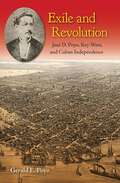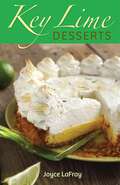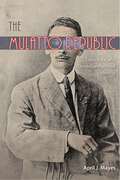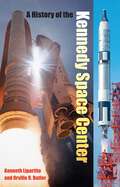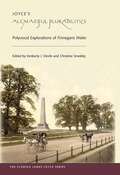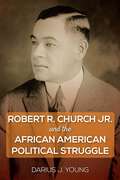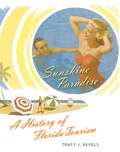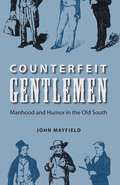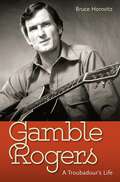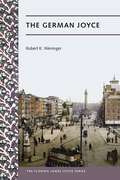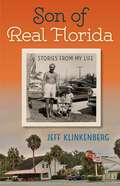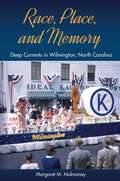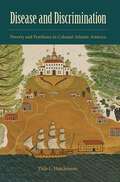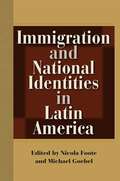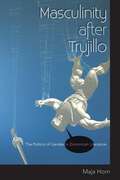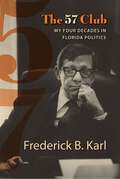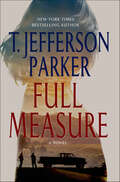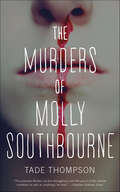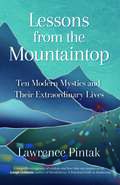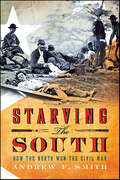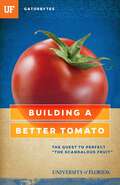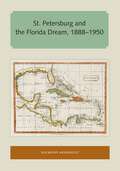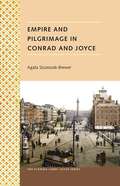- Table View
- List View
Exile and Revolution: José D. Poyo, Key West, and Cuban Independence
by Gerald E. PoyoJosé Dolores Poyo (1836-1911) was an activist, publisher, social critic, fundraiser, and foundational figure in the campaign for Cuban independence from Spain. His leadership and his mantra-"adelante la revolución" (forward the revolution)-mobilized an insurrectionist movement in Key West. His multidimensional grassroots work and his newspaper El Yara, the longest-lived Cuban exile newspaper of the nineteenth century, gave hope to a people who aspired to be liberated from the bonds of colonialism. In Exile and Revolution, Gerald Poyo provides a comprehensive account of how his great-great-grandfather spurred the working-class community of Key West to transform their roles as supporting cast to become critical actors in the struggle for Cuban independence. The book reveals the depth of Cuba’s longtime ties to Florida, the cigar industry, and its workers; the experience of Cubans in the American South; and the diplomatic intrigues involving Spain, Cuba, and the United States.
Key Lime Desserts
by Joyce LaFrayA delicious and versatile fruit, the Key Lime is an exotic addition to back yard gardens and a favorite on restaurant menus. Gourmets and novices alike will rave over easy-to-prepare recipes such as Key Lime Drop Cookies, Frozen Key Lime Cake Supreme, and Key Lime Rum Sherbet. Not to be forgotten are variations on traditional Key Lime pie including Black Bottom Key Lime Pie, Mango Key Lime Pie, and Key Lime Ice Cream Pie.
The Mulatto Republic: Class, Race, and Dominican National Identity
by April J. Mayes&“Impels the reader to not lean solely on the crutch of Dominican anti-Haitianism in order to understand Dominican identity and state formation. Mayes proves that there was a multitude of factors that sharpen our knowledge of the development of race and nation in the Dominican Republic.&”—Millery Polyné, author of From Douglass to Duvalier &“A fascinating book. Mayes discusses the roots of anti-Haitianism, the Dominican elite, and the ways in which race and nation have been intertwined in the history of the Dominican Republic. What emerges is a very interesting and engaging social history.&”—Kimberly Eison Simmons, author of Reconstructing Racial Identity and the African Past in the Dominican Republic The Dominican Republic was once celebrated as a mulatto racial paradise. Now the island nation is idealized as a white, Hispanic nation, having abandoned its many Haitian and black influences. The possible causes of this shift in ideologies between popular expressions of Dominican identity and official nationalism has long been debated by historians, political scientists, and journalists.In The Mulatto Republic, April Mayes looks at the many ways Dominicans define themselves through race, skin color, and culture. She explores significant historical factors and events that have led the nation, for much of the twentieth century, to favor privileged European ancestry and Hispanic cultural norms such as the Spanish language and Catholicism.Mayes seeks to discern whether contemporary Dominican identity is a product of the Trujillo regime—and, therefore, only a legacy of authoritarian rule—or is representative of a nationalism unique to an island divided into two countries long engaged with each other in ways that are sometimes cooperative and at other times conflicted. Her answers enrich and enliven an ongoing debate. Publication of this digital edition made possible by a Sustaining the Humanities through the American Rescue Plan grant from the National Endowment for the Humanities.
A History of the Kennedy Space Center
by Kenneth Lipartito Orville R ButlerThis first comprehensive history of the Kennedy Space Center, NASA's famous launch facility located at Cape Canaveral, Florida, reveals the vital but largely unknown work that takes place before the rocket is lit. Though the famous Vehicle Assembly Building and launch pads dominate the flat Florida landscape at Cape Canaveral and attract 1.5 million people each year to its visitor complex, few members of the public are privy to what goes on there beyond the final outcome of the flaring rocket as it lifts into space. With unprecedented access to a wide variety of sources, including the KSC archives, other NASA centers, the National Archives, and individual and group interviews and collections, Lipartito and Butler explore how the methods and technology for preparing, testing, and launching spacecraft have evolved over the last 45 years. Their story includes the Mercury and Gemini missions, the Apollo lunar program, the Space Shuttle, scientific missions and robotic spacecraft, and the International Space Station, as well as the tragic accidents of Challenger and Columbia. Throughout, the authors reveal the unique culture of the people who work at KSC and make Kennedy distinct from other parts of NASA.
Joyce's Allmaziful Plurabilities: Polyvocal Explorations of Finnegans Wake (Florida James Joyce)
by Kimberly J. Devlin and Christine Smedley“A brilliantly collaged snapshot of the variety and wealth of literary criticism, and Joyce studies, today.”—Tony Thwaites, author of Joycean Temporalities “Celebrates the multiplicity and sheer rampant excess of Joyce’s prodigally polysemous text with seventeen different scholars employing a likewise prodigal range of critical methodologies.”—Patrick O’Neill, author of Impossible Joyce: Finnegans Wakes “Each of the scholars involved is at the top of his and her game. Their commitment and excitement about the task at hand is evident on virtually every page. This book makes the Wake relevant and accessible to a whole new generation of readers.”—Garry Leonard, author of Advertising and Commodity Culture in Joyce This is the first Finnegans Wake guide to focus exclusively on the multiple meanings and voices in Joyce’s notoriously intricate diction. Rather than leveling the text it illuminates many layers of puns, wordplay, and portmanteaus, celebrating the Wake’s central experimental technique. Renowned Joyce scholars explore the polyvocality of individual chapters using game theory, ecocriticism, psychoanalysis, historicism, myth, philosophy, genetic studies, feminism, and other critical frameworks. They set in motion cross-currents and radiating structures of meaning that permeate the entire text and open up satisfying readings of the Wake for novices and seasoned readers alike. A volume in the Florida James Joyce Series, edited by Sebastian D. G. Knowles
Robert R. Church Jr. and the African American Political Struggle
by Darius J. YoungSouthern Conference on African American Studies, Inc., C. Calvin Smith Book AwardThis volume highlights the little-known story of Robert R. Church Jr., the most prominent black Republican of the 1920s and 1930s. Tracing Church’s lifelong crusade to make race an important part of the national political conversation, Darius Young reveals how Church was critical to the formative years of the civil rights struggle. A member of the black elite in Memphis, Tennessee, Church was a banker, political mobilizer, and civil rights advocate who worked to create opportunities for the black community despite the notorious Democrat E. H. “Boss” Crump’s hold over Memphis politics. Spurred by the belief that the vote was the most pragmatic path to full citizenship in the United States, Church founded the Lincoln League of America, which advocated for the interests of black voters in over thirty states. He was instrumental in establishing the NAACP throughout the South as it investigated various incidents of racial violence in the Mississippi Delta. At the height of his influence, Church served as an advisor for Presidents Harding and Coolidge, generating greater participation of and recognition for African Americans in the Republican Party. Church’s life and career offer a window into the incremental, behind-the-scenes victories of black voters and leaders during the Jim Crow era that set the foundation for the more nationally visible civil rights movement to follow. Publication of the paperback edition made possible by a Sustaining the Humanities through the American Rescue Plan grant from the National Endowment for the Humanities.
Sunshine Paradise: A History of Florida Tourism (The Florida History and Culture Series)
by Tracy J. RevelsFor nearly two hundred years, Floridians have eagerly exploited tourism as the key to economic prosperity. As a result, the state has constantly reshaped and remodeled itself as different types of tourist heavens, and many aspects of its history have become inseparable from the fantastic images created by the tourism industry. From spa retreats to nature preserves, from riverboat rides to roller coasters, and from railroads to theme parks, the state’s dependence on tourism has greatly shaped its identity.Sunshine Paradise is the first book to focus exclusively on how--and why--tourism came to define Florida. Offering a concise look at the subject from the 1820s to the present, Tracy Revels demonstrates tourism’s relevance to all other major aspects of Florida history, including the Civil War, the land boom, and civil rights.In this enjoyable and well-written history, Revels shows how Florida’s tourism industry has remained adaptive and expansive, ready to sell the next version of paradise to northerners hungry for sunshine. She also explains why the state’s business and political leaders must consider the history of tourism development as they plan for the state’s future.
Counterfeit Gentlemen: Manhood and Humor in the Old South (New Perspectives on the History of the South)
by John MayfieldWhat does it mean to be a man in the pre–Civil War South? And how can we answer the question from the perspective of the early twenty-first century? John Mayfield does so by revealing how early nineteenth-century Southern humorists addressed the anxieties felt by men seeking to chart a new path between the old honor culture and the new market culture. Lacking the constraints imposed by journalism or proper literature, these writers created fictional worlds where manhood and identity could be tested and explored.
Gamble Rogers: A Troubadour's Life
by Bruce HorovitzFlorida Book Awards, Bronze Medal for Florida Nonfiction Florida Historical Society Charlton Tebeau Award Beloved raconteur, environmentalist, and down-home philosopher, Gamble Rogers (1937–1991) ushered in a renaissance of folk music to a place and time that desperately needed it. In this book, Bruce Horovitz tells the story of how Rogers infused Florida's rapidly commercializing landscape with a refreshing dose of homegrown authenticity and how his distinctive music and personality touched the nation. As a college student, motivated by personal advice from William Faulkner to stay true to himself, Rogers broke away from his family's prestigious architecture business. Rogers was a skilled guitar player and storyteller who soon began performing extensively on the national folk music circuit alongside Pete Seeger, Doc Watson, and Jimmy Buffett. He discovered a special knack for public radio, appearing frequently as a guest commentator on NPR’s All Things Considered. Rogers was known across the country for his intricate fingerpicking guitar style and rapid-fire stage act. Audiences welcomed his humorous homespun tales set in the fictitious Oklawaha County, which was based on places from his own upbringing and populated by a cast of unforgettable characters. His stories evoked rural life in Florida, celebrated the state's natural resources, and called attention to life's many small ironies. As Florida was experiencing colossal growth embodied by the new Kennedy Space Center and Disney World, Rogers's folksy style cheered and reassured listeners in the state who worried that their traditional livelihoods and locales were disappearing. Horovitz shows that even beyond his genius as a performing artist, Rogers was loved for his compassion, integrity, connection with people, and courage. Rogers displayed these widely admired traits for the last time when—on a camping trip to the beach—he tried to save a drowning stranger despite back problems that made it almost impossible for him to swim. This heroic effort led to his untimely death. The life of Gamble Rogers is a window into an important creative subculture that continues to flourish today as contemporary folk artists take on roles similar to the one Rogers established for himself. A modern-day troubadour, Rogers delighted in entertaining audiences with what was familiar and real—by championing the ordinary people of his home community who were closest to his heart.
The German Joyce (Florida James Joyce)
by Robert K. Weninger"The first comprehensive account of the enormous impact of Joyce on German modernist and postmodern writers. An indispensable book on Joyce's 'German' face."—Gerald Gillespie, Stanford University In August 1919, a production of James Joyce's Exiles was mounted at the Munich Schauspielhaus and quickly fell due to harsh criticism. The reception marked the beginning of a dynamic association between Joyce, German-language writers, and literary critics. It is this relationship that Robert Weninger analyzes in The German Joyce. Opening a new dimension of Joycean scholarship, this book provides the premier study of Joyce's impact on German-language literature and literary criticism in the twentieth century. The opening section follows Joyce's linear intrusion from the 1910s to the 1990s by focusing on such prime moments as the first German translation of Ulysses, Joyce's influence on the Marxist Expressionism debate, and the Nazi blacklisting of Joyce's work. Utilizing this historical reception as a narrative backdrop, Weninger then presents Joyce's horizontal diffusion into German culture. Weninger succeeds in illustrating both German readers' great attraction to Joyce's work as well as Joyce's affinity with some of the great German masters, including Goethe and Rilke. He argues that just as Shakespeare was a model of linguistic exuberance for Germans in the eighteenth century, Joyce became the epitome of poetic inspiration in the twentieth. This volume, through Weninger's critiques and repositions, simultaneously revisits the fraught relationship between influence and intertextuality in literary studies and reassesses their value as tools for contemporary comparative criticism today. Robert K. Weninger, emeritus professor of German and comparative literature at King’s College London, is author or editor of over ten books, including Arno Schmidts Joyce-Rezeption 1957-1970: Ein Beitrag zur Poetik Arno Schmidts, and is a past editor of the Journal of Comparative Critical Studies.
Son of Real Florida: Stories from My Life
by Jeff KlinkenbergAs stories about "Florida Man" inspire wild headlines in the news, Florida's most beloved chronicler is here to show that the state is more than the stereotypes. Award-winning journalist Jeff Klinkenberg has explored what makes Florida unique for nearly half a century, and Son of Real Florida is a compelling retrospective of essays on the state he knows so well. Klinkenberg tells what it was like growing up in pre-air conditioning Florida and becoming a newspaper reporter in mid-century Miami. He introduces us to the stout-hearted folks who have learned to live and even prosper among the insects, sharp-toothed critters, and serious heat. We meet beekeeper Harold P. Curtis and his prized orange blossom honey; frog whisperer Avalon Theisen; Sheepshead George of St. Petersburg; and Miss Martha, the oyster-shucking queen of Apalachicola. This book also takes us to some of the most interesting, little-known places in the state. We travel to Solomon's Castle of reclaimed materials, the neighborhood of "Rattlesnake, Florida," and the smallest post office in the United States. Along the way, Klinkenberg stops to impart true Florida wisdom, from how to eat a Key lime pie to which writers and artists every Floridian should know. Above all, Klinkenberg portrays Florida's people, places, food, and culture with a deep understanding that does not relegate them to cliche. He writes with warmth and authenticity of a state he still sees as wondrous in its own ways. Though some may think the real Florida is a thing of the past, he says, "Do not tell me Florida is no longer a paradise."
Race, Place, and Memory: Deep Currents in Wilmington, North Carolina (Cultural Heritage Studies)
by Margaret M. MulrooneyA revealing work of public history that shows how communities remember their pasts in different ways to fit specific narratives, Race, Place, and Memory charts the ebb and flow of racial violence in Wilmington, North Carolina, from the 1730s to the present day.Margaret Mulrooney argues that white elites have employed public spaces, memorials, and celebrations to maintain the status quo. The port city has long celebrated its white colonial revolutionary origins, memorialized Decoration Day, and hosted Klan parades. Other events, such as the Azalea Festival, have attempted to present a false picture of racial harmony to attract tourists. And yet, the revolutionary acts of Wilmington’s African American citizens—who also demanded freedom, first from slavery and later from Jim Crow discrimination—have gone unrecognized. As a result, beneath the surface of daily life, collective memories of violence and alienation linger among the city’s black population.Mulrooney describes her own experiences as a public historian involved in the centennial commemoration of the so-called Wilmington Race Riot of 1898, which perpetuated racial conflicts in the city throughout the twentieth century. She shows how, despite organizers’ best efforts, a white-authored narrative of the riot’s contested origins remains. Mulrooney makes a case for public history projects that recognize the history-making authority of all community members and prompts us to reconsider the memories we inherit.A volume in the series Cultural Heritage Studies, edited by Paul A. ShackelPublication of the paperback edition made possible by a Sustaining the Humanities through the American Rescue Plan grant from the National Endowment for the Humanities.
Disease and Discrimination: Poverty and Pestilence in Colonial Atlantic America
by Dale L. HutchinsonChoice Outstanding Academic Title Disease and discrimination are processes linked to class in the early American colonies. Many early colonists fell victim to mass sickness as Old and New World systems collided and new social, political, economic, and ecological dynamics allowed disease to spread.Dale Hutchinson argues that most colonists, slaves, servants, and nearby Native Americans suffered significant health risks due to their lower economic and social status. With examples ranging from indentured servitude in the Chesapeake to the housing and sewage systems of New York to the effects of conflict between European powers, Hutchinson posits that poverty and living conditions, more so than microbes, were often at the root of epidemics.
Winning While Losing: Civil Rights, The Conservative Movement and the Presidency from Nixon to Obama (Alan B. and Charna Larkin Symposium on the American Presidency)
by Kenneth Osgood and Derrick E. White"Explor[es] the paradoxical nature of racial politics in the post–civil rights period. . . . Does us the service of detailing how different presidential administrations handled civil rights, complicating our understanding of the major themes that defined the era."--American Historical Review "Adds depth to our historical understanding of how various presidents and their administrations approached issues pertaining to the equal rights of black (and to a lesser extent, Hispanic) Americans in a number of institutional and legislative arenas."--Journal of American History "Expertly link[s] executive decision-making and electoral strategizing with the politics of civil rights."--Journal of American Studies "Examines the forward and backward movement of civil rights since the resurgence of conservative politics in 1968. . . . Welcome and helpful."--Journal of Southern History "An invaluable addition to the rapidly developing historiography of neoconservativism, particularly the ideology’s relationship with African Americans."--Louisiana History "A striking example of a successful meshing of historical and political science methodologies and scholarship."--North Carolina Historical Review "This remarkable study offers breakthrough findings and insights about the state of civil rights policies in the post-civil rights era."--Hanes Walton Jr., coauthor of American Politics and the African American Quest for Universal Freedom "Eschewing easy absolutes, Winning While Losing presents a carefully nuanced interpretation of the subtle gains and losses experienced by liberals and conservatives, by Democrats and Republicans, and by proponents of racial justice and their opponents."--Harvard Sitkoff, author of Toward Freedom Land "Insightful and fascinating. Sets an agenda for further scholarly debate about the puzzle of 'winning while losing' that defines the fortunes of civil rights and the stratagems of politicians over the past generation."--Robert Mason, author of Richard Nixon and the Quest for a New Majority "A comprehensive account of the links between racism, conservatism, and presidential politics in the post-civil rights era."--Greta de Jong, author of Invisible Enemy: The African American Freedom Struggle after 1965 During the four decades separating the death of Martin Luther King and the election of Barack Obama, the meaning of civil rights became increasingly complex. Civil rights leaders made great strides in breaking down once-impermeable racial barriers, but they also suffered many political setbacks in their attempts to remedy centuries of discrimination. Complicating matters, the conservative turn in American political life transformed the national conversation about race and civil rights in surprising ways. This pioneering collection of essays explores the paradoxical nature of civil rights politics in the years following the 1960s civil rights movement by chronicling the ways in which presidential politics both advanced and constrained the quest for racial equality in the United States.
Immigration and National Identities in Latin America
by Nicola Foote and Micheal Goebal"This groundbreaking study examines the connection between what are arguably the two most distinguishing phenomena of the modern world: the unprecedented surges in global mobility and in the creation of politically bounded spaces and identities."--Jose C. Moya, author of Cousins and Strangers "An excellent collection of studies connecting transnational migration to the construction of national identities. Highly recommended."--Luis Roniger, author of Transnational Politics in Central America "The importance of this collection goes beyond the confines of one geographic region as it offers new insight into the role of migration in the definition and redefinition of nation states everywhere."--Fraser Ottanelli, coeditor of Letters from the Spanish Civil War "This volume has set the standard for future work to follow."--Daniel Masterson, author of The History of Peru Between the mid-nineteenth and mid-twentieth centuries, an influx of Europeans, Asians, and Arabic speakers indelibly changed the face of Latin America. While many studies of this period focus on why the immigrants came to the region, this volume addresses how the newcomers helped construct national identities in the Caribbean, Mexico, Argentina, and Brazil. In these essays, some of the most respected scholars of migration history examine the range of responses--some welcoming, some xenophobic--to the newcomers. They also look at the lasting effects that Jewish, German, Chinese, Italian, and Syrian immigrants had on the economic, sociocultural, and political institutions. These explorations of assimilation, race formation, and transnationalism enrich our understanding not only of migration to Latin America but also of the impact of immigration on the construction of national identity throughout the world. Contributors: Jürgen Buchenau | Jeane DeLaney | Nicola Foote | Michael Goebel | Steven Hyland Jr. | Jeffrey Lesser | Kathleen López | Lara Putnam | Raanan Rein | Stefan Rinke | Frederik Schulze
Masculinity after Trujillo: The Politics of Gender in Dominican Literature
by Maja Horn"Provides an insightful look at the persistent power of masculinism in Dominican post-dictatorship politics and literature."--Ignacio López-Calvo, author of God and Trujillo "The ideas about masculinization of power developed by Horn are important not only to Dominican scholarship but also to Caribbean and other Latin American students of the intersection of history, political power, and gendered practices and discourses."--Emilio Bejel, author of Gay Cuban Nation Any observer of Dominican political and literary discourse will quickly notice the prevalence of certain notions of hyper-masculinity. In this extraordinary work, Maja Horn argues that these gender conceptions became ingrained during the dictatorship (1930-1961) of Rafael Leonidas Trujillo, as well as through the U.S. military occupation that preceded it. Where previous studies have focused mainly on Spanish colonialism and the sharing of the island with Haiti, Horn emphasizes the underexamined and lasting influence of U.S. imperialism and how it prepared the terrain for Trujillo’s hyperbolic language of masculinity. She also demonstrates how later attempts to emasculate the image of Trujillo often reproduced the same masculinist ideology popularized by his government. Through the lens of gender politics, Horn enables readers to reconsider the ongoing legacy of the Trujillato, including the relatively weak social movements formed around racial and ethnic identities, sexuality, and even labor. She offers exciting new interpretations of such writers as Hilma Contreras, Rita Indiana Hernández, and Junot Díaz, revealing the ways they challenge dominant political and canonical literary discourses.
The 57 Club: My Four Decades in Florida Politics (Florida Government and Politics)
by Frederick B. KarlThe 57 Club was the self-assigned name of the thirty-nine legislators first elected to the Florida House of Representatives in 1956. Karl's fascinating autobiography not only recalls those years, when Florida was in the midst of a transformation away from its rural, racially segregated, Deep South roots, but also offers intimate details into a half century of public service.By sharing his own experiences and reactions, describing what he witnessed or heard along the way, and telling stories about friends and colleagues, Karl gives readers a front row seat to some of the most captivating and turbulent moments in twentieth-century Florida politics. His insights into how the legislature functions--from the politics of committee assignments to the usefulness of lobbyists, from the savvy use of rules on the floor to debating skills, from polite ways of punishing unethical colleagues to the use of humor to calm angry exchanges, and much more--all make for an absorbing tale.
All Our Worst Ideas
by Vicky SkinnerTwo teens who have nothing in common work together at a record store in All Our Worst Ideas, a powerful and voice-driven YA novel from Vicky Skinner.When Amy, on her way to becoming valedictorian of her graduating class and getting accepted to her dream school, gets dumped by her long-term boyfriend, she takes a job at a record store to ease the pain. She needs a distraction, badly. Oliver, Amy’s record store co-worker, isn’t so sure about Amy—his complete opposite—but what he is sure of is his decision not to go to college. He just can’t figure out how to tell his mother. As they work late-night shifts at the record store, Amy and Oliver become friends and then confidantes and then something more, but when Amy has a hard time letting go of what she thought was her perfect future with her ex, she risks losing the future she didn’t even know she wanted with Oliver.
Full Measure: A Novel
by T. Jefferson Parker"A tense and compelling drama of the wars without and the wars within—and of the flame of violence that burns through the American psyche." —T.C. Boyle, New York Times bestselling author of The Women"Stunning . . . [Parker is] a brave and daring writer." —Lisa See, New York Times bestselling author of Shanghai Girls and Dreams of Joy"A great American family novel. . . . Parker is playing in the same league as John Steinbeck." —Stephen Harrigan, author of The Gates of the Alamo and Remember Ben ClaytonPatrick Norris has seen the worst that Afghanistan has to offer–excruciating heat, bitter cold, and death waiting behind every rock as comrades are blown to pieces by bombs and snipers. He returns home exhilarated by his new freedom and eager to realize his dream of a sport fishing business. But he is shocked to learn that the avocado ranch his family has owned for generations in the foothills of San Diego has been destroyed by a massive wildfire and the parents he loves are facing ruin.Ted Norris worships his brother and yearns for his approval. Gentle by nature, but tormented by strange fixations with a dark undercurrent, Ted is drawn into a circle of violent, criminal misfits. His urgent quest to prove himself threatens to put those he loves in peril.Patrick puts his own plans on hold to save the family's home and falls in love with Iris, a beautiful and unusual woman, when disaster strikes. When Ted's plan for redemption goes terribly wrong, he tries to disappear. Desperate to find his brother and salvage what remains of his family, Patrick must make an agonizing choice.Three-time Edgar Award-winner T. Jefferson Parker is known for his many bestselling crime novels, from Laguna Heat to The Famous and the Dead.Full Measure marks a departure; it is a literary novel that explores many subjects, among them the bonds of loyalty between brothers.
The Murders of Molly Southbourne
by Tade Thompson"A bold outpouring of flesh and crisis at once horrifying and familiar." —The New York TimesWinner of the 2018 Nommo Award for Best NovellaEvery time she bleeds a murderer is born. Experience the horror of Tade Thompson's The Murders of Molly Southbourne. A finalist for the 2017 BSFA Award, the 2017 Shirley Jackson Award. The rule is simple: don’t bleed.For as long as Molly Southbourne can remember, she’s been watching herself die. Whenever she bleeds, another molly is born, identical to her in every way and intent on her destruction.Molly knows every way to kill herself, but she also knows that as long as she survives she’ll be hunted. No matter how well she follows the rules, eventually the mollys will find her. Can Molly find a way to stop the tide of blood, or will she meet her end at the hand of a girl who looks just like her?At the Publisher's request, this title is being sold without Digital Rights Management Software (DRM) applied.
Lessons from the Mountaintop: Ten Modern Mystics and Their Extraordinary Lives
by Lawrence PintakLessons from the Mountaintop is an inspiring account of the experiences of modern-day spiritual explorers who have dedicated their lives to the mystic quest to find their own Truth. It is aimed at readers looking for answers in our complex and challenging world. Few of us will ever retreat to a mountaintop or spend decades in monastic silence. Some of the individuals profiled in Lessons from the Mountaintop have done exactly that. Others have spent their lives studying with spiritual masters of multiple traditions. A New York record company art director, a medical doctor from Australia, a formerly unhoused non-binary BIPOC Californian, and other once “ordinary” folk who have carved out their own unique spiritual paths. You will not find them on the best seller lists or the Spiritual 100 rankings. Most of them quietly pursue their spiritual quest far from the media spotlight. What prompted them to walk away from it all? What do they see that the rest of us do not? What lessons do they bring “back” from their spiritual journeys? What can we learn from them? Veteran journalist and author Lawrence Pintak introduces the reader to individuals of grace and profound spiritual experience who he has encountered in his decades reporting from around the globe, and others he sought out as he explored unfamiliar spiritual traditions. The result is a fascinating collection of profiles that offer deep insight into what has been called the “perennial wisdom” at the heart of the world’s religions. Lessons from the Mountaintop contains lessons for us all, whether we are religious, spiritual, or simply trying to navigate our complex and challenging world.
Starving the South: How the North Won the Civil War
by Andrew F. SmithA historian's new look at how Union blockades brought about the defeat of a hungry Confederacy In April 1861, Lincoln ordered a blockade of Southern ports used by the Confederacy for cotton and tobacco exporting as well as for the importation of food. The Army of the Confederacy grew thin while Union dinner tables groaned and Northern canning operations kept Grant's army strong. In Starving the South, Andrew Smith takes a gastronomical look at the war's outcome and legacy. While the war split the country in a way that still affects race and politics today, it also affected the way we eat: It transformed local markets into nationalized food suppliers, forced the development of a Northern canning industry, established Thanksgiving as a national holiday and forged the first true national cuisine from the recipes of emancipated slaves who migrated north. On the 150th anniversary of the Battle of Fort Sumter, Andrew Smith is the first to ask "Did hunger defeat the Confederacy?".
Building a Better Tomato: The Quest to Perfect "The Scandalous Fruit"
by Jeff Klinkenberg University of FloridaIn the search for a superior alternative to bland and mealy grocery-store tomatoes, horticultural scientist Harry Klee and renowned taste researcher Linda Bartoshuk teamed up and are hot on the trail of a specimen that will have you thinking you just picked it in your own back yard. Gatorbytes highlight for the intellectually curious the world of innovative research happening at the University of Florida. Written by professional journalists, Gatorbytes feature the top research and preeminence work being conducted at the University of Florida, written in a way that’s easy to understand.
St. Petersburg and the Florida Dream, 1888–1950 (Florida and the Caribbean Open Books Series)
by Raymond ArsenaultThe books in the Florida and the Caribbean Open Books Series demonstrate the University Press of Florida’s long history of publishing Latin American and Caribbean studies titles that connect in and through Florida, highlighting the connections between the Sunshine State and its neighboring islands. Books in this series show how early explorers found and settled Florida and the Caribbean. They tell the tales of early pioneers, both foreign and domestic. They examine topics critical to the area such as travel, migration, economic opportunity, and tourism. They look at the growth of Florida and the Caribbean and the attendant pressures on the environment, culture, urban development, and the movement of peoples, both forced and voluntary. The Florida and the Caribbean Open Books Series gathers the rich data available in these architectural, archaeological, cultural, and historical works, as well as the travelogues and naturalists’ sketches of the area in prior to the twentieth century, making it accessible for scholars and the general public alike. The Florida and the Caribbean Open Books Series is made possible through a grant from the National Endowment for the Humanities and the Andrew W. Mellon Foundation, under the Humanities Open Books program.
Empire and Pilgrimage in Conrad and Joyce (Florida James Joyce)
by Agata Szczeszak-Brewer"Original and significant. This book shows us how Conrad and Joyce manipulate representations of imperialist belief in the sacred to indict Western culture for its racist colonization. This striking reading of modernism emphasizes Conrad's and Joyce's use of chaos in general and pilgrimage in particular in terms of mapmaking, racial denigration, and strategies of power. Szczeszak-Brewer makes spectacular connections between sacred language, nation building, and literary representation."--Georgia Johnston, author of The Formation of Twentieth-Century Queer Autobiography Though they were born a generation apart, Joseph Conrad and James Joyce shared similar life experiences and similar literary preoccupations. Both left their home countries at a relatively young age and remained lifelong expatriates. Empire and Pilgrimage in Conrad and Joyce offers a fresh look at these two modernist writers, revealing how their rejection of organized religion and the colonial presence in their native countries allowed them to destabilize traditional notions of power, colonialism, and individual freedom in their texts. Throughout, Agata Szczeszak-Brewer ably demonstrates the ways in which these authors grapple with the same issues--the grand narrative, paralysis, hegemonic practices, the individual's pilgrimage toward unencumbered self-definition--within the rigid bounds of imperial ideologies and myths. The result is an engaging and enlightening investigation of the writings of Conrad and Joyce and of the larger literary movement to which they belonged.
